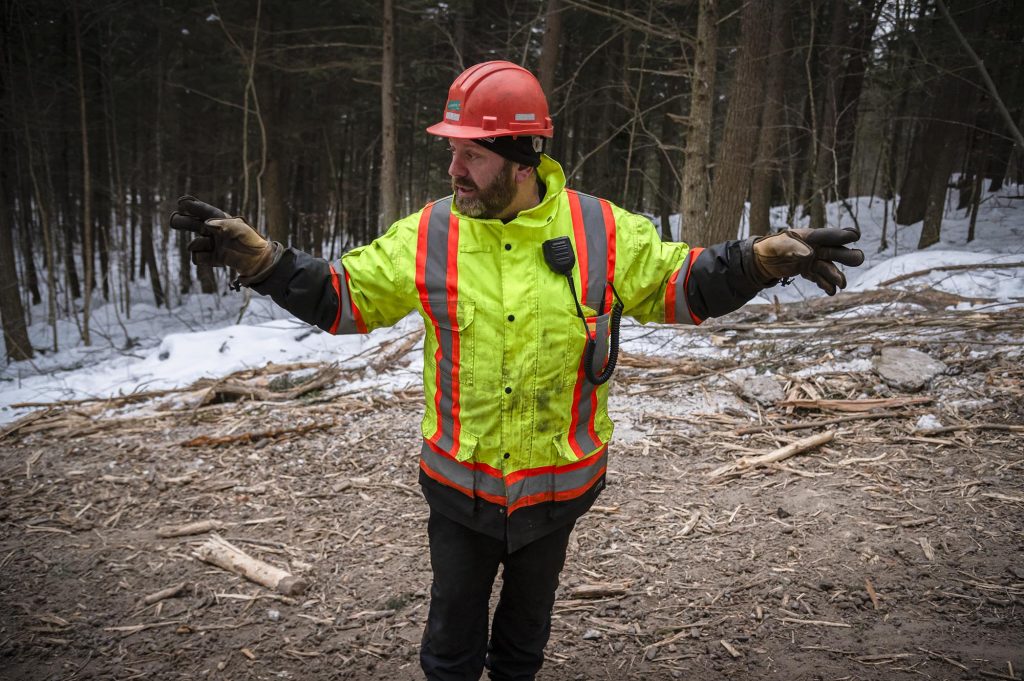Most loggers work between 160 and 180 days per year, according to Sam Lincoln, the owner of Lincoln Farm Timber Harvesting. But this year, since the end of March, he’s worked 31.
“I don’t think I had turned a wheel on a machine for two weeks prior to that, he said. “It was so wet.”
The summer’s wet weather and flooding wreaked havoc for many Vermonters who work on the land, and loggers were no exception. In addition to flood-damaged equipment, muddy logging roads prevented workers from accessing woodlots, resulting in a lot of time off the job.
The industry had at least $2.8 million in losses, according to a survey conducted and published by the Vermont Department of Forest, Parks and Recreation. Loggers and the department say that number is a conservative estimate of the losses.
“I’m talking to businesses that have lost hundreds of thousands of dollars,” said Lincoln, a former deputy commissioner of the department.
While state officials report that some lumber mills suffered losses, logging contractors were the business category hit hardest within the industry, with reported losses of more than $1.8 million, according to the survey report. Several companies reported losses topping $100,000.
Most of the damages came in the form of business interruption, according to the survey results.
Lincoln said he saw an 80% loss in revenue this summer, “and I still have to service my debt, pay my insurance, make repairs.” He used his equipment to help towns dig out in the immediate aftermath of the July floods, he said, and he knows others who are still working as contractors to help repair the roads.
Heather Holt, office manager at Fontaine Sawmill in East Montpelier, said her business was lucky, having ordered an unusually large amount of wood over the winter. The business buys its wood almost exclusively from Vermont loggers, she said.
“We were able to actually sustain through the summer, which I don’t think we would have been able to, had we not done that,” Holt said. “It’s only been recently that we’ve started receiving loads in again.”

Danielle Fitzko, commissioner of the Department of Forest, Parks and Recreation, said loggers are “absolutely impacted by climate change.”
Adapting, she said, may require loggers to shift their business models, buy new equipment or change the location of their work based on the new weather trends.
While the summer brought extra stress to the industry, a complete picture of the industry’s current struggles can only be achieved by zooming out, Lincoln said.
During the Covid-19 pandemic, as businesses needed more shipping material than usual and people engaged in home improvement and new building projects, demand rose. Recently, it’s dipped.
“All supply chains had been pushing to stay full through Covid, trying to produce, trying to produce, trying to produce to meet demand, and then all of a sudden demand came off,” Lincoln said. “And that was just like a big 10-car pileup.”
Then came last winter’s wet weather, followed by a brief stint of good working conditions and then spring thaw — and then the summer flooding.
“Not only have we not been able to work much — and when I say ‘we,’ I mean loggers everywhere — when we are working, we’re facing significantly lower prices for the material we’re producing,” Lincoln said.
Fitzko said “a suite” of support is available to loggers who have been affected by flooding through the Federal Emergency Management Agency, and loans are available through the Small Business Administration. A new Emergency Forest Restoration Program aims to address damages from the summer’s flooding, providing private landowners cost-sharing payments to restore land damaged by a natural disaster. Loggers could be the contractors to help complete that work, Fitzko said.
Lincoln and Fitzko worry that the decline of the timber industry in Vermont could lead some landowners to sell their woodlots to developers. Fitzko cited a state initiative called Vermont Forest Future, which intends to chart a path toward financial stability for the industry in Vermont.
“I don’t at all think it’s a hopeless situation,” Lincoln said. “I’m still here, still working, still planning for jobs, still moving forward. But it’s serious.”
Read the full article here














